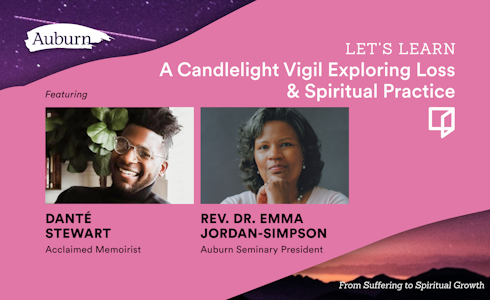Coping with Grief and Loss: Finding Growth through Spirituality and Religion



April 03, 2023
Related Event

Experiencing grief is a complex and multifaceted journey that can be triggered by various circumstances, including the loss of a loved one. Grief can take a significant toll on a person's mental and physical health, as well as challenge their beliefs and values. While everyone experiences grief differently, spirituality and religion can play an important role in the grieving process, offering comfort, support, and a sense of meaning in the face of loss. In this blog post, we will explore the different facets of grief and growth from diverse spiritual and religious perspectives, particularly when mourning traumatic deaths and navigating the loss of family members.
Understanding Grief and Loss
Grief, a universal human experience, impacts people from all walks of life. It is an emotional response to the loss of someone or something significant, and it can be triggered by various circumstances, including death, divorce, illness, and job loss. While grief is a natural part of the human experience, coping with grief can be a difficult and painful process to navigate.
Spirituality and Religion in Grief
Spirituality and religion can offer a sense of purpose and direction, helping people to make sense of their experiences and find a path forward. While spirituality and religion are often used interchangeably, they have different meanings. Spirituality refers to the human experience of seeking meaning, purpose, and connection with something greater than oneself, while religion is a set of beliefs, practices, and values that are shared by a community of people who are united by a common faith or tradition.
Navigating the Loss of Family Members
One of the most challenging aspects of grieving is the loss of a family member, particularly a child, parent, or sibling. These losses can be especially traumatic, as they involve the loss of someone who is an integral part of one's life and identity. The grief that accompanies these losses can be intense and long-lasting, and it can take a toll on a person's mental and physical health.
Other Causes of Grief
While grief resulting from the loss of a family member is a common experience, there are other types of grief and loss that individuals may experience. These can include the loss of a relationship, the loss of a job or career, the loss of a home or community, or the loss of physical health or abilities.
Spirituality and religion can also play a role in navigating these different types of grief. For example, individuals may turn to their faith or spiritual practices to find comfort and strength during times of relationship loss or job loss. They may seek out spiritual leaders or counselors to help them process their emotions and find a path forward towards healing and growth.
Similarly, individuals who experience the loss of physical health or abilities may turn to spirituality and religion as a means of coping with their pain and suffering. They may seek out rituals or practices that help them connect with a higher power or find meaning in their experiences.
It is important to remember that grief is a complex experience, and that individuals may experience different types of grief at different times in their lives. By exploring the different spiritual and religious perspectives on loss and mourning, individuals can find comfort and support in the midst of their pain, regardless of the source of their grief.
Spiritual Crises Accompanying Grief
When mourning traumatic deaths or navigating other types of grief, spiritual crises can arise, particularly when core belief systems are shattered. The loss of a loved one can challenge one's understanding of the world and their place in it. This can lead to feelings of confusion, isolation, and despair. In these situations, spirituality and religion can provide a sense of stability and hope, offering a framework for understanding death and loss and a pathway to healing. They can become pathways for healing and transforming experiences of grief into meaning and possibility.
Diverse Spiritual and Religious Perspectives on Grief and Growth
Many religious traditions offer specific rituals and practices designed to help mourners honor the dead and find comfort in their faith. For example, in the Christian tradition, there are specific rituals and practices associated with mourning the loss of a loved one, such as attending church services, reciting prayers and hymns, and participating in sacraments. Similarly, in the Hindu tradition, specific rituals and practices are associated with mourning, such as performing puja and participating in cremation rituals. In the Jewish tradition, mourners participate in shiva, a seven-day period of mourning where friends and family members visit the home of the bereaved to offer support and comfort. There is also the recitation of the Kaddish, a prayer that is recited by mourners to honor the dead and seek peace for their souls. Similarly, in the Buddhist tradition, there are specific practices associated with mourning, such as meditation and mindfulness practices, that help individuals process their emotions and find peace in the midst of their pain. Buddhism also teaches the concept of impermanence, which can help individuals come to terms with the reality of loss and find a path forward towards healing and growth.
In various cultures around the world, people of all backgrounds honor their grief with death festivals. This includes Día de los Muertos, or Day of the Dead in Spanish, is a festival celebrated yearly in Mexico and worldwide by people of Mexican heritage where people build altars in their homes that include photos of the dead, food, drinks, flowers, and more to commemorate relatives and loved ones who have passed.
Regardless of the specific religious tradition, the rituals and practices associated with mourning serve an important function in helping individuals find comfort and support in the midst of their grief. By participating in these practices, individuals can connect with their faith, honor the dead, and find hope and healing in the midst of their pain.
Finding Growth through Loss and Grief
While grief is a difficult and painful process, it can also be an opportunity for growth and transformation. By acknowledging and working through their emotions, individuals can develop greater resilience, compassion, and self-awareness. However, facilitating growth can be particularly challenging when a person has lost a family member and their faith. In these situations, seeking out support from a counselor or spiritual leader can be helpful in navigating the complexities of grief and finding a path forward.
--
Grief is a universal human experience that impacts people from all walks of life. Spirituality and religion can offer comfort, support, and a sense of meaning in the face of loss, particularly when mourning traumatic deaths and navigating the loss of family members. While every individual's experience with grief is unique, there are common threads that unite us in our shared humanity. By exploring the different facets of grief and growth from diverse spiritual and religious perspectives, we can find comfort and support in the midst of our pain.
Whether it is through attending religious services, participating in rituals and practices, or seeking out support from spiritual leaders and counselors, spirituality and religion can provide a sense of hope and stability during difficult times. However, it is important to remember that grief is a process that takes time and patience and that it is okay to seek help when needed. By working through our emotions and seeking out support, we can find a path forward and facilitate growth through loss and grief.
In conclusion, navigating grief and growth through spirituality and religion can be a powerful tool for healing and transformation. By understanding the different facets of grief and exploring the diverse spiritual and religious perspectives on loss and mourning, we can find comfort and support in the midst of our pain. While the journey of grief can be difficult and challenging, it is important to remember that there is hope and healing on the other side. With patience, perseverance, and support, we can navigate the complexities of grief and find a path forward towards growth and transformation.
Connect with Others on the Journey of Grief and Healing
If you or someone you know is navigating the challenges of grief and loss, consider reaching out to others who share similar experiences. Join a support group or attend an event where you can connect with others who are coping with grief and finding growth through spirituality and religion. By sharing your story and learning from the experiences of others, you can find solace and strength during this difficult time.
Related Event


